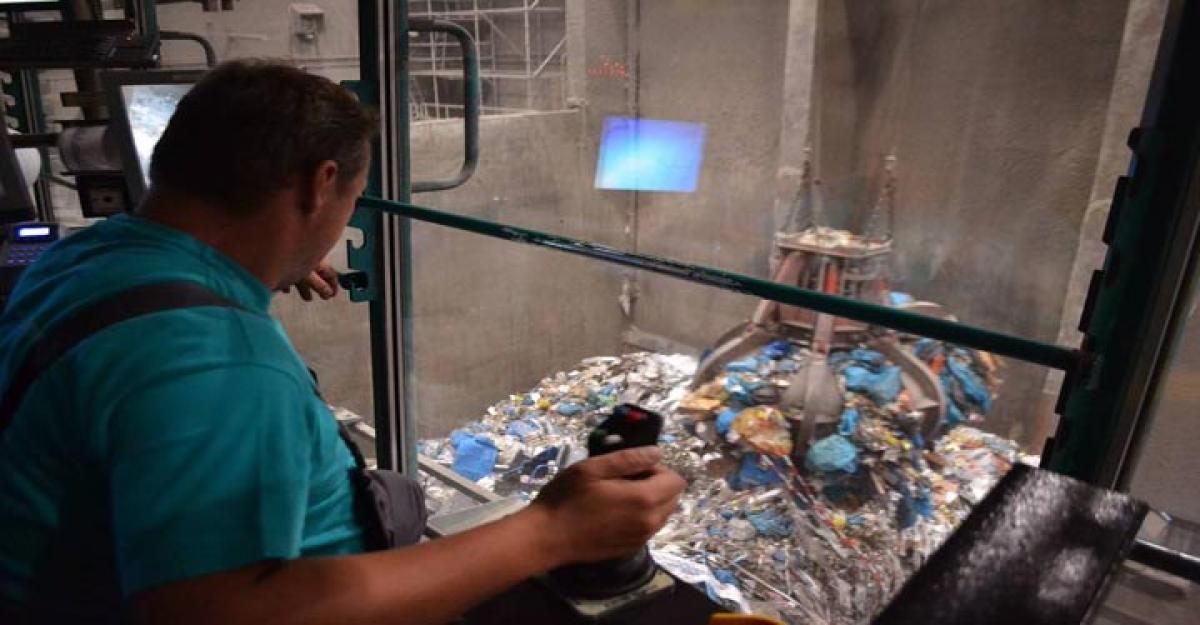Live
- Canada confirms first domestically acquired human case of H5N1 bird flu
- Aspirants continue stir in Prayagraj against UPPSC’s staggered exam plan
- AI-Powered Legal Research to Enhance Compliance
- Rohit, Virat have left Indian cricket in safe hands: Kaif reacts after strong show from youngsters
- Derogatory remarks case: Madras HC denies anticipatory bail to actor Kasthuri
- Arvind Kejriwal Visits Tirumala Offers Prayers to Lord Venkateswara Swamy
- BJP, JD-S trying to bring down Cong govt; we will not let it happen: K’taka Home Minister
- How to Get the iPhone 15 at Rs 27,960 Off - Step-by-Step Guide to Availing the Discount
- India’s IT-flexi staffing industry to see steady 7 pc annual growth till FY26
- Shiv Sena slams MVA for 'defaming' central agencies over Uddhav Thackeray's luggage check
Just In

A burning need for garbage. Each day, trucks roll into this city filled with the latest hot import from the streets of Manchester, England: Garbage.
STRAW INTO GOLD
Lack of garbage forces German power plants to import waste
Magdeburg: Each day, trucks roll into this city filled with the latest hot import from the streets of Manchester, England: Garbage. The destination is a power plant that makes a business of turning trash into electricity, or as it touts in a brochure, “spinning straw into gold.”
 The straw in this case is large, pillowy blobs of rubbish, neatly wrapped in plastic. “Like a marshmallow,” beams Rolf Oesterhoff, manager of the MHKW Rothensee waste-to-energy plant. A waste not, want not attitude mixed with a national zeal for recycling has led to an awkward problem for Germany: It isn’t producing enough of its own trash.
The straw in this case is large, pillowy blobs of rubbish, neatly wrapped in plastic. “Like a marshmallow,” beams Rolf Oesterhoff, manager of the MHKW Rothensee waste-to-energy plant. A waste not, want not attitude mixed with a national zeal for recycling has led to an awkward problem for Germany: It isn’t producing enough of its own trash.
Over the past decade, heaps of garbage-burning power plants and composting facilities were built throughout Germany as the country shut off all its landfills to new household trash. But instead of growing, as many thought it would, household-waste production flattened, in part because sparing Germans edged their already-high recycling rate even higher.
Taken with the effects of a declining population and the global recession, plants in Germany were left short millions of tons of garbage a year, a quandary for companies that depend on a steady stream of rubbish to keep the lights on. So the country turned to its trashier neighbours.
Now by boat and by truck, waste is piling in from England, Ireland, Italy and Switzerland, among others, to plants, where it gets burned and converted to electricity that keeps German households on the grid. In Magdeburg, about 100 miles from Berlin, the trash is converted to electricity for one-third of the city, and heating for roughly 50,000 homes.
The imports are made possible by a European Union directive to gradually phase out landfills. That has led to higher taxes on landfill use in countries like Great Britain, making the trans-border shipping economically feasible. An MHKW Rothensee waste-to-energy power plant converts trash into electricity and heating for citizens of Magdeburg, Germany.
Yet while the Netherlands and Sweden have made a business out of importing and processing their neighbors’ waste, rising rubbish imports are causing a backlash in Germany, where recycling and generally reducing waste is something of a national obsession. The reverence of reduction dates back decades.
In 1991, Germany passed a sweeping law that institutionalized recycling, one that helped inspire movements in other countries including the US, where about 34% of waste is now recycled. Today, the recycling rate here counts among the highest in the world, by some measures, at roughly 65% of household trash. Within houses and apartments, kitchen waste bins can have four or more compartments for sorting various categories of recycling.
Further down the rubbish chain, communal containers in the courtyards or basements of apartment buildings span almost the full rainbow spectrum: In Berlin, there are different-colored bins for clear, brown and green glass, yellow bins for some plastic—but not all—brown bins for organic refuse, blue ones for paper and cardboard—but not all—and black or gray bins for everything else.
“We are a German generation that grew up with recycling,” said Stefan Korn, a 30-year-old Berlin resident. Mr. Korn is a founder of the boutique Upcycling Deluxe GmbH, one of a half dozen of so-called “upcycling” stores in Berlin. They take old clothing and other refuse and reconstitute it as chic handicrafts and apparel—at a less-than-trashy price. Courtesy: The Wall Street Journal

© 2024 Hyderabad Media House Limited/The Hans India. All rights reserved. Powered by hocalwire.com







